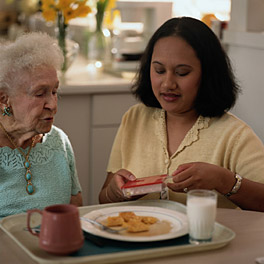For many seniors, medication is a part of their daily routine and medication safety should be a top priority. It is easy for anyone to take their medication incorrectly, but it is more likely for seniors to make prescription errors due to issues including:
- Misunderstanding the prescription and when or how to take it
- An inability to read the tiny labels on the bottles due to vision problems
- Forgetting to take their prescription due to an age-related mental illness
Medication safety is very important because medication errors cost billions of dollars and lead to millions of deaths every year. Since July is Prescription Awareness month, we wanted to highlight some important thoughts about medication safety for seniors.
Medication Safety Tips
There are safety steps seniors can take to manage their medications, including knowing and understanding the prescriptions, getting organized, and/or seeking outside help.
Tip 1: Understand Your Medication. Almost 40% of seniors are unable to read prescription labels and 76% of seniors are unable to understand the information given to them. When it comes to understanding your prescriptions, your doctor and pharmacist are your best source of information. Below are ideas of how you can better understand your medications.
- If you are ever unsure about why you need to take a certain medication, ask your doctor for an explanation.
- Keep your doctor informed of all the medications you are taking, including non-prescription drugs, vitamins, and dietary supplements. This can help decrease any possible drug interactions and negative side effects.
- Your pharmacist is your best resource for information and tips about when and how to take your medication.
- Once you know what medications you are taking and why, take the time to become familiar with the actual pills. Know the names, both brand and generic, of your prescriptions and what they look like, including color, shape, size and markings.
- If you think your medications are causing any serious side effects, contact your doctor immediately.
Tip 2: Get organized. Organization can be an extremely helpful way of managing your medications. Some ideas for getting organized include:
- Use a weekly or daily pill box to help you organize your pills into days and times of day (morning, afternoon, evening).
- If you need further support, get a pill box that includes an alarm to remind you when to take your medication.
- Keep an up-to-date list of all medications. On the list, be sure to include both the generic and brand names of the drugs, as well as the dosage and times you take the medication. If you have other important things that a doctor or hospital would need to know, including allergies or sensitivities, add it to the list as well.
- Post your medication list in an easily accessible area so you can review it daily to ensure proper usage. (This is also helpful in case emergency personnel are in your home and need this information.)
- Keep your medications together and in their original bottles to help prevent mix-ups and forgotten doses.
Tip 3: Get outside help. Sometimes, no matter how much a person or family member tries to manage their medications personally, it can become overwhelming. This can be especially true among seniors. If understanding and organization becomes too much, there are agencies such as like Compassionate Care Home Health Services that can assist with medication management. If any of the following statements describe you or a family member, then medication management may be the best choice.
- High risk of noncompliance to treatment regime, including forgetting to take medications or not finishing the treatment.
- A need for monitoring drug interactions.
- Serious and persistent mental illness.
- Exacerbation of chronic mental illness.
- Behavioral or emotional problems exacerbated by physical illness.
- Physical disability preventing medication compliance.
- Alzheimer’s Disease or Dementia.
- Chronic pain and related depression.
- Anxiety/panic attacks.
- Frequent hospitalizations.
- Emotional crisis.
- Family members and caregivers in need of support and education.
By having one of Compassionate Care’s licensed nurses assist with your medications, it will allow you to remain in the comfort of your own home while knowing your medications are properly arranged and monitored regularly. If you have any questions about medication management or any other in home care questions, call a Compassionate Care office near you, or call our Central Intake number 1-877-308-1212.
Through individual or professional medication management, you can rest assured that you will be able to safely control your prescriptions. If you need further information on your medications, consult your doctor. Also, the FDA published an article with additional information on avoiding medication mistakes.

